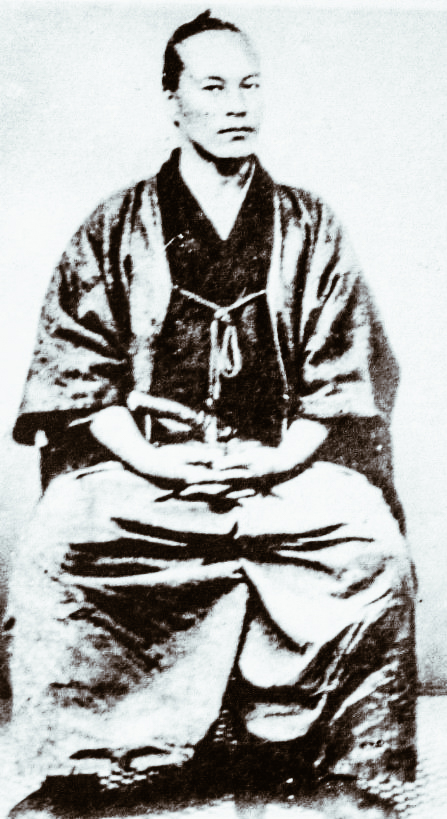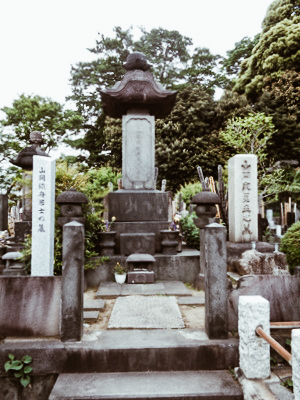Ono Tetsutaro, better known as Yamaoka Tesshu, was born in Tokyo on June 10, 1836. His father was Ono Asaemon, of the Tokugawa court, and her mother Iso was the daughter of a monk of the Kashima temple. At the age of 9 he began the practice of Jikishinkage ryu and a few years later the Hono ha Itto ryu, while at the age of 17 he started the study of the spear with the master Yamaoka Seizan, who died prematurely two years later. Tetsutaro was adopted into the master’s family, and married his sister, taking the name Yamaoka Tesshu.
Yamaoka Tesshu and his history
Author: SaiKaiAngel

photo credits: musubi.it
Although he had a not negligible physicality, considering his 185 cm height and his weight of 110 kg, he was able to assert himself only with his incredible personality and sensitivity. However many times he was not able to stop himself, even to the point of denying the existence of Buddha, sentient beings and realization. Nothing to give and nothing to receive.
At that point, Master Dokuon struck him with his pipe and said: “If nothing exists, then where does this anger come from?”
From the world of the sword, he received many teachings. In one of the meetings with master Sasakibara Kenkichi, he stood still for 40 minutes together with his opponent, facing each other in their respective guards until both rested their weapons. At the age of 28, Tesshu was unexpectedly defeated by the 40-year-old Asari Gimei, master of the Nakanishi Ha Itto-ryu school. From that moment on, he could no longer give peace to the idea of defeat against an older man, of whom he had become a disciple but failed to understand his teaching. Asari, without hitting him, forced him to step back out of the dojo by closing the door in his face.
Tesshu’s introspective study lasted 16 years, without being able to understand what was wrong with his technique, his lifestyle, despite the training and Zen teachings. On March 30, 1880, Tesshu during a zazen session went to Asari and asked him for a new fight. Asari declined, justifying himself with these few words, “Now you have arrived”. From that moment he left teaching and his school to Tesshu who succeeded in developing a method called Muto ryu (school without sword) different from the Itto ryu especially in teaching, still practised but by a very small group of people. He died on July 19, 1888, at fifty-three years of age due to stomach cancer. Before dying, he wrote his Jisei no ku (poem of death), closed his eyes and, even in death, did not abandon his style assuming the formal posture of zazen, as can be seen from the drawing of his disciple Tanaka Seiji.
During Tesshu’s funeral at the Zensho-an temple the monk Tekisui composed these verses:
Sword and brush balanced between Absolute and Relative
His loyal courage and noble strength pierced Paradise.
A dream of fifty-three years,
Wrapped by the pure fragrance of the flourishing lotus in the middle of the roaring fire.
Again, Katsu Kaishu, a great swordmaster, wrote the following words next to a portrait of Tesshu:
Valiant and wise, this virile man accomplishes great things
His sword was incomparably sublime
Its illumination embraced everything
Will future generations ever see the same?
Explanation of Mute Ryu

photo credits: wikipedia.org
The goal of Muto Ryu is “no enemy”. Everything depends on the mind. If we imagine a very skilful opponent, our sword stays still, if we imagine a weak opponent, the mind opens and the sword is free. This is proof that nothing exists except the mind. Taken by agitation, a warrior would move the sword without thinking and confusedly without hitting the opponent. From this idea was born the school of non-sword (Muto ryu). Out of mind there is no sword, this means: not sword corresponds to not mind; not mind means a mind that is stable everywhere. If the mind stops, the opponent appears; if the mind keeps moving there is no enemy. Continuous and intense training leads to the stage of no enemy.
Tesshu’s method required intensive and incessant training focused mainly on basic principles. The first 3 years were dedicated to the study of the 5 basic kata of Muto ryu and it was forbidden to follow in that period the teachings of other schools. Three levels of seigan were foreseen for advanced students, who were admitted only after having passed a trial period consisting of 1000 consecutive days of training. In order to pass the first seigan level, 200 sword fights had to be fought in a single day; the second level provided for 3 days with 600 fights and the third, 7 days with 1400 fights.
The name of Yamaoka Tesshu’s dojo, Shumpukan, comes from a poem by Chinese monk Bukko Kokushi:
In heaven and on earth there are no points to hide
Joy belongs to those who recognize that things
They are empty and man is also nothing.
Splendid indeed the long Mongolian swords
Blasting the spring wind like a flash of light
The shumpu, the spring wind, gave the name to the dojo.
The writings of Yamaoka Tesshu
Below we have some writings by Tesshu that better describe his strong personality:
Return to the Beginner’s Mind, August 1882
If the wonders of swordplay elude you, it returns to the beginner’s mind. The beginner’s mind is not just any kind of mentality: striking as the only intention without thinking about the movement of the body and moving forward with force is proof that you have forgotten yourself. Technicians are hindered by analytical thoughts. When the obstacle of a discursive approach is overcome, the wonders of the art of the sword can be appreciated. In the beginning, it is necessary to practice with well-tempered swordsmen in order to discern one’s own inadequacies. Pursue your study to the end, awaken your irresistible strength, practice tirelessly until your heart is immovable, and then you will understand. Practice until no doubt remains. Surely the time will come to discover the wonders.
From Itto shoden Muto Ryu Kanaji Mokuroku: Suigetsu (the moon in the water), April 10, 1884.
Even when the water from a puddle is moved in the ladle, the moon is reflected in it. The moon’s reflection is not lost when the water moves from ladle to ladle. When you are disturbed, then there is no reconnaissance; the moon does not appear in the agitated water. If your mind is calm and the ladle is still, the moon’s reflection is maintained.
Do not concentrate
When hitting your opponent
Move naturally
Like moonbeams penetrating
In a homeless hut
You may be unhappy with a roofless hut, but the same moon that illuminates the skies naturally fills it with its light. So, you can attack your opponent and win. Regardless of keeping your little self, charge towards your opponent. If you are confused or nervous you will surely lose.
Other Famous Phrases
As a samurai, I must strengthen my character; as a human being I must perfect my spirit
Thirst for victory leads to defeat; not tiring of defeat leads to victory.
If you want to obtain the secrets of such wonderful techniques, drill yourself, harden yourself, undergo severe training, abandoned body and mind; follow this course for years and you will naturally reach the most profound levels. To know if the water is hot or cold you must taste it yourself.
Zen is like soap. First, you wash with it, and then you wash off the soap.
Do not think that this is all there is. More and more wonderful teachings exist.
The world is wide, full of happenings. Keep this in mind and never believe ‘I’m the only one who knows.’
The moon does not think to be reflected, nor does the water think to reflect, in the Hirosawa Pond.
Unfortunately, many of his writings are apocryphal, but that does not make them less profound and important for life than anyone who has read them. We think that they can be a help even nowadays in many situations.
Political and Social Life

photo credits: wiki.samurai-archives.com
Tesshu also had an active political and social life as a negotiator. He was first in the service of the shogun, so at the end of the war Boshin in 1869 treated the surrender in front of the siege of the imperial forces commanded by Saigo Takamori.
His success was the fact that he focused on establishing contact with the enemy forces, with linear but provocative conduct: he intimidated the enemy of the emperor to let him pass without fear.
If we think of Tesshu’s impetuous character, never willing to give in to compromises, it is really strange to see him as a great negotiator. In his short and adventurous life he was also the emperor’s bodyguard, with his readiness of reflexes and decisions.
Share this:
- Click to share on Facebook (Opens in new window)
- Click to share on Twitter (Opens in new window)
- Click to share on Tumblr (Opens in new window)
- Click to share on Pinterest (Opens in new window)
- Click to share on Telegram (Opens in new window)
- Click to share on WhatsApp (Opens in new window)
- Click to share on Reddit (Opens in new window)
- Click to print (Opens in new window)






